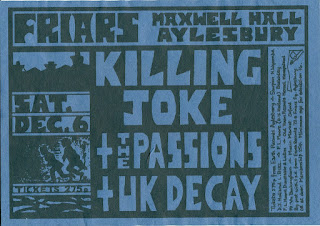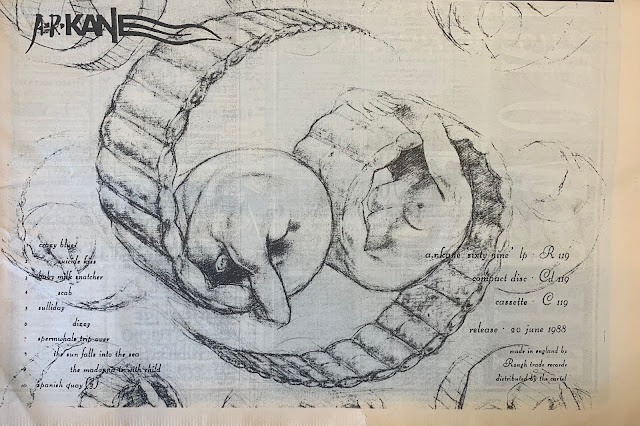The Guardian asked me to write about blogging.
One thing I observe is that although the freedom and fun offered by the format endures, the inter-blog communication of the heyday has faded away. At least, in this particular corner of the 'sphere.
Blogging has become more of a solitary activity. A blogpost will be sparked by something "out there," or by something within, but rarely in response to another blog.
This reminded me that the last time I did a bit of meta-blogging - the 20th anniversary rumination of a year ago - I'd intended to do a follow up: a tribute to the blogs of yesteryear, nodes in a network that once crackled like the synapses of an ever-growing mega-brain. Here, belatedly, is a sketch towards such a memorial.
In the beginning... what sparked my interest was a bunch of blogs and blog-like entities whose existence I noticed around 2000 or so. There was Tom Ewing's outlets New York London Paris Munich and Freaky Trigger, Tim Finney's Skykicking, Jess Harvell's blogs (Let's Build A Car, Technicolor, Rebellious Jukebox, others still?). Then there was Alastair Fitchett's webzine Tangents, featuring contributors like Kevin Pearce (under the name John Carney, for reasons unknown). And Robin Carmody's website Elidor (later on he blogged at House At World's End and Sea Songs and also here).
All sorts of oddball characters sprouted up around then, offering skewed perspectives and obsessive accumulations of knowledge. There was Josh Kortbein (who still maintains Joshblog). Scott of Somedisco. David Howie aka I Have Zero Money. Others still.
So the scene was bubbling before I jumped into the fray in October 2002. Still, it's fair to say that the launch of Blissblog had an accelerant effect. I must have been one of the first pros to start a music blog, although I'd had a website since 1996.
Another accelerant was the excitement about grime - at that point such an emergent sound it wasn't even known as grime yet. Wot-U-Call-It represented probably around 70% of the spur for me to start the blog - at the time I was largely taken out of journalistic commission by Rip It Up and Start Again and I desperately wanted to shout about this latest insurgency from the nuum zone. But I also just fancied having an opinions outlet - fancied joining in the arguments. Skiving off work while staying sat in front of the screen, in those first three years of blogging I generated probably a book's worth of text even while writing a not-short book on postpunk.
Everyone knows about K-punk and Woebot (at the start known as That Was A Naughty Bit of Crap) (and which went away, then came back, then went away, came back and then went away yet again - but currently still exists). (And who remembers woebot.tv?)
There was also Luke Davis's heronbone (urgent dispatches from the frontlines of grime, but also poetry and psychogeography), Silverdollarcircle (similarly pirate radio focused), Martin Clark's Blackdown, John Eden at Uncarved, Paul Meme's Grievous Angel....
(A precursor to this kind of nuum-oriented bloggige was turn-of-millennium webzine Hyperdub, launched by Kode9 well before the label of the same name, and a place where Mark Fisher did some of his earliest public writing about music (under the name Mark De' Rosario) alongside UKdance forum stalwart Bat, Kevin Martin, Kodwo Eshun, and indeed myself. The Hyperdub archives used to be maintained by bloggish entity Riddim.ca, but have now sadly disappeared. A couple of the proto-K-punk's pieces can be found here, though.)
Adjacent to this cluster but pursuing his own obsessions (Cabaret Voltaire, bleep, etc) and probably more aligned with dubstep than grime, there was Nick Edwards's once-prolific, long-shuttered Gutterbreaks. Then there was History Is Made At Night, an archaeology of rave and club lore - and the interface between dance culture and politics - maintained by Neil Transpontine to this day. And the bashmentological analyses of scholar Wayne Marshall at Wayne & Wax.
Getting deeper into the 2000s, the sporadic but extensive posts of Leaving Earth, by the enigmatic Taninian, claimed treasure in underappreciated genres like wobble and skwee, reassessed The Rave LP, and lost me a little with the paeans to postdubstep-as-revolution. Other electronic-music slanted blogs came and went - Acid Nouveaux, Mentasms, Sonic Truth, Mutant Technology, Drumtrip, Musings of a Socialist Japanologist, Tufluv, World of Stelfox, MNML SSGS - saying interesting things for a year or two before going silent. Probably the most impressive of the second wave of electronic music oriented blogz was Adam Harper's Rouge's Foam.
Rewind a bit: by the mid-2000s, the scene was cleaving between the grimy nuum end of things and the poptimistic cru, each represented by a forum, although neither was as monolithically committed in stance or subject matter as the other might like to make out. Still, you could have good arguments about these kinds of issues with the likes of Zoilus (aka Carl Wilson), Utopian TurtleTop. Koganbot, Nick Southall's Auspicious Fish, Jane Dark's Sugarhigh. Less-good arguments with others.
Anti-rockist (OG anti-rockist 4 life) but in an orbit of his own: Momus, elegant and incisive public essayist rather than blogger per se, but hosting a lot of action in the comments. The blog was once called Click Opera, I believe.
When grime faded as a conversation-starter and centripetal agent, hauntology - for a while, for some - provided a new focus....
Now there was a bunch of blogs whose preexisting obsessions with retro design, vintage TV, bygone modernist aesthetics, and sundry musty esoterica placed them in proximity to the H-zone, among them Toys and Techniques, Feuilleton, Rockets and Rayguns, Dispokino, I Hate This Film, and The Sound of Eye. Then there was collective blog Found Objects.
There was another and quite separate gaggle that included Kid Shirt (aka Kek-W), An Idiot's Guide To Dreaming (aka Loki aka Saxon Roach) and Farmer-Glitch (aka Stephen Ives) who could be considered fellow-travelers, albeit approaching the H-zone from a different angle: that esoterrorist thread running from Coil-y industrial to the eldritch fringes of rave and UK techno (The Black Dog and that sort of thing). Funnily enough, their very proximity made them sniffy about the H-word - both as concept and in terms of the output getting bigged up. Some of this blog cluster generated its own wyrdtronic output, via alter-egos like IX-Tab, Hacker Farm, Kemper Norton....
Other bloggers stepped into the sonic fray: Gutterbreaks became Ekoplekz and half of eMMplekz, Woebot became a musical as well as textual entity, and K-punk created a bunch of audio essays/ sound artworks.
While Mark Fisher was a pillar of our end of the scene, K-punk also played a central role in a separate circuit of renegade-academic and philosophy-politics blogs. Not a neighbourhood I frequented much, but Alex Williams at Splintering Bone Ashes had some things to say while Steven Shaviro still does The Pinocchio Theory.
Quite a lot of people on this circuit became authors (and /or fulfilled other functions) within the Zer0 / Repeater empire: Xenogothic's Matt Colquhoun, Robin James of It's Her Factory, Dominic Fox of Poetix.
Others came to the imprints via different paths: Carl Neville aka the Impostume, Phil Knight with his mystifyingly closed-and-erased The Phil Zone and later ceased-but-not-deleted The Interregnum Navigation Service. Owen Hatherley of Sit Down Man, You're a Bloody Tragedy and The Measures Taken, Alex Niven of The Fantastic Hope, Rhian E. Jones with Velvet Coalmine. There was a cluster of collective blogs oriented around decades - the '70s, '80s, '90s - that involved many of these people and lively places they were for a while.
And then there were those who pursued their own completely personal path into the scene (and out again), helped in some cases by geographical distance - operating in a completely different hemisphere. Anwen Crawford (another who mystifyingly deleted their back pages - in this case fangirl), Sam Macklin a.k.a connect_icut with Bubblegum Cage III, Geeta Dayal with The Original Soundtrack (now she has a Patreon), Jon Dale with Worlds of Possibility and Attic Plan and Astronauts Notepad, Sam Davies's Zone Styx Travelcard, Aaron Grossman's Airport Through the Trees, Graham Sanford's Our God Is Speed, Tim 'Space' Debris's Cardrossmaniac2, W. David Marx's Néojaponisme, Oliver Craner, Beyond the Implode, Baal at Erase the World, Tom May's Where Shingle Meets Raincoat, Seb's And You May Find Yourself... , Dan Barrow's porridge-free zones The End Times and A Scarlet Tracery....
Some of these bloggers were already writing in "proper" publications; some started after blogging....
There were various alternatives to blogs that went through vogues - livejournals and tumblrs - but I never really cathected with either of these mode-zones, couldn't see what they brought that was a bonus.
And today... As I say in the column, there's still loads of blogs - loads of specifically music blogs or mostly-music blogs. Some started relatively recently, like the sporadic but very interesting Aloysius, the work of Dissensus bod Mvuent, and Infinite Speeds, a Substack by Vincent Jenewein exploring interfaces between philosophical concepts and the materialities of electronic sound + rhythm. Others, I'm unclear when they started but they have entered my ken only recently, like Lost Tempo (another Substack), the work of regular commenter Matt M. And I see that ex-editor of The Wire Derek Walmsley, who used to have a blog back in the 2000s, recently started a new one: Slow Motion.
There are generation-or-two-below-me oriented entities somewhere between a one-person magazine and a collective blog. Like Joshua Minsoo Kim's Toneglow (another Substack). Like No Bells. To which my own flesh-and-blood contributes, while also operating his own KPRblog (currently surveying 2023 in music).
So I wind to a close, with so many names unmentioned.
Forgive me - it's almost certainly by accident.























